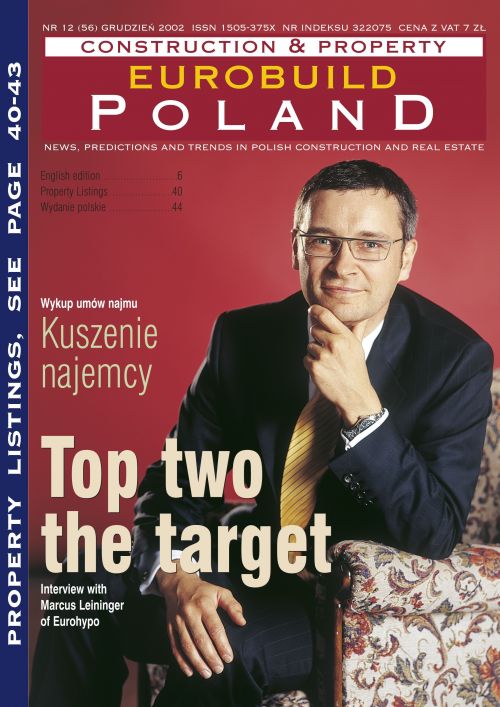Very tender procedures
Tenders were created to make the procedure of selecting the best bids as unambiguous and uncontroversial as possible. Because of the frequent tensions between investors and participants however, tenders particularly public ones, don't enjoy the greatest of reputations in Poland. What could be the solution?
Przedsiębiorstwo Państwowe (PPL) Porty Lotnicze's selection of the main contractor for the development of Okęcie airport and ING Real Estate's decision as to who would build their retail complex, Złote Tarasy, are two recent examples of major tenders for construction work. The tenders followed quite different procedures, which is perhaps why, whereas the former tender commission's choice was disputed by the unsuccessful bidders, the latter did not experience any such problems.
Problems with documentation
"What is quite astonishing is the fact that major, respectable construction
companies in Poland do a sloppy job preparing their tender documents. It is not
unusual for bank guarantees to be incorrectly drawn up or that the submitted
documents are badly initialled," says Bogdan Chudziak, Director for the
development of the Okęcie airport extension.
Bogdan Klukowski of Warbud, on the other hand, claims that a lot of reliable
companies end up losing tenders because of very minor and futile flaws in their
offer portfolios, and supports the idea of bidders having the right
to clarification, of the areas questioned by the tender commissions. This way
there would be less reason to suspect any biased and selective treatment of the
competing companies. "It's too often the case that firms aren't able to
look at all the tender documentation and if you consider that bidders are
expected to offer, among other things, fair and credible prices, they should
really be given unrestricted access, says Klukowski."
Grey areas
One of the problems indicated by bidders is that the criteria applied when
offers are evaluated are far too vague and indeed, arithmetically overwhelming,
which makes them vulnerable to various interpretations and their appraisal
questionable. So, are they worth simplifying?
Zbigniew Obłoza, responsible for the organization of tenders within the
framework of the Phare Cross Border Co-operation Programme, believes that they
are. "The Phare procedures are clearer than those run in accordance with
official regulations, which contain such obscure notions as trustworthiness or
experience. We, on the other hand, are solely concerned with the price, and the
simplicity of our regulations allows us to retain our common sense during
tenders."
International procedures
Jerzy Hanczewski of ING RE, maintains that one of the reasons the Złote Tarasy
tender escaped controversy was the application of FIDIC (the International
Federation of Engineering Consultants), procedures. He goes on to say that since
the analysis and appraisal procedures are very clear, they give tender
organizers a fuller view of bidders' financial standing and allow a more
thorough study of the offers made. "Thankfully, these regulations have been
adopted by the main Polish construction companies and it would be pointless
applying even the best procedures if nobody on the market was aware of them,"
says Hanczewski, who adds however, that the company might have managed to avoid
appeals from unsuccessful bidders, for reasons other than the accessibility of
the regulations.
Private and public tenders - different worlds
Bogdan Klukowski maintains that, given their different nature and legal
principles, public and private tenders should be considered separately. "Owing
to the commonly-applied consultation, pre-selection and negotiation procedures,
sometimes at a number of stages, a private investor has an undeniable advantage
over a public one. The private tender process enables the contractor to present
the company via examples of both former and current undertakings, as well as the
formal documentation. The procedure allows contractors to present their bid and
proposals for improving the investment properly, and therefore make the best use
of time and the price," says Bogdan Klukowski, adding that public
procedures don't provide such possibilities. The act on public orders states
that investors must maintain an equal distance from each of the bidders and
visits to construction sites, for example, would reduce that distance to a
perilous extent.
Possible solutions
How could the procedures and organisation of tenders be changed to make them
less cumbersome and truly serve the purpose of selecting the best bid? Jerzy
Hanczewski claims that one of the strong points of private tenders is good
communication between the parties. "As a result, the offer made by the
potential contractor fully reflects the investor's needs. Sometimes I get the
impression that with public tenders, the organisers themselves aren't always
clear about what they expect from the competing firms."
Bogdan Klukowski goes on to say that for a start, the legislation concerned with
so called 'additional' works, which helps a lot of firms win tenders with
suspiciously low prices, should be repealed because the same bidders later seek
to increase their contracts by the statutory 20%, on the grounds of having come
up against unexpected circumstances. "Changing the legislation would force
the organizer to take full responsibility for the assessment of the tender
documentation as well as the tender procedure itself. Bidders on the other hand,
would have to predict and carefully consider all the circumstances surrounding
the tender and the conditions related to construction work, knowing that
increasing costs would be practically impossible. The possible consequences of
underestimating the value of the contract would undermine weak and inexperienced
firms, to the advantage of reliable, technically viable and experienced
companies."





















































